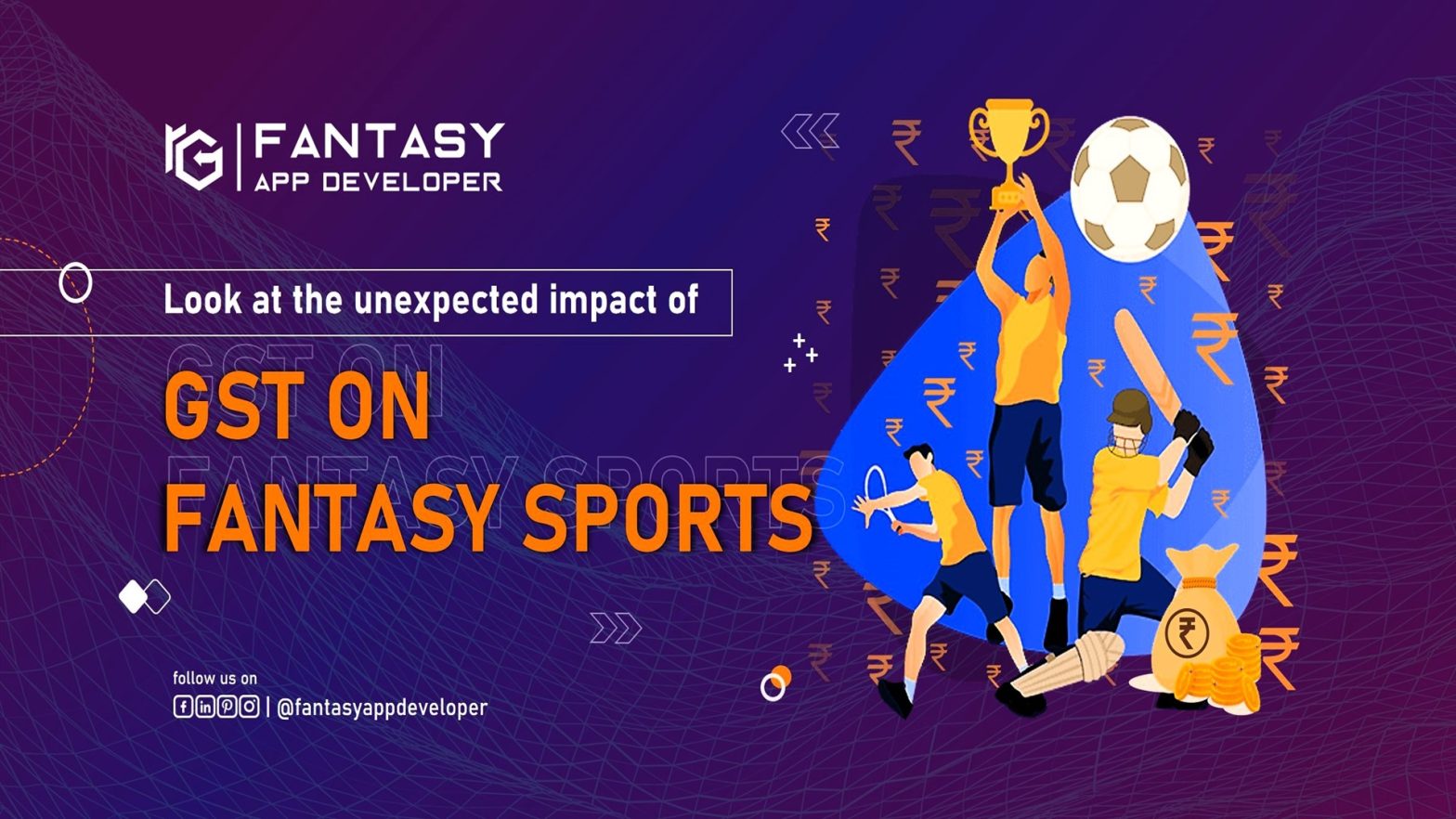In recent years, the online gaming sector has witnessed transformative growth, attracting millions of global online players. Fantasy gaming is one of the most popular genres within this industry because it gives participants a chance to form virtual teams and compete against other teams based on the real-world performance of professional sports players.
Table of Content
- GST and Online Fantasy Gaming
- What is the impact of increased GST on online fantasy gaming platforms?
- 01. Shift in Player Preferences
- 02. Impact on Small Stakeholders
- 03. Increased Financial Burden
- 04. Regulatory Challenges
- The rate of GST currently levied
- Implication of GST and future considerations
- – Legal Clarity
- – GST Application
- – Consumer Confidence
- – Precedent for Skill-Based Gaming
- Conclusion – The final words!
- FAQ
However, the government’s introduction of a uniform 28% goods and services tax (GST) on online gaming has raised concerns among fantasy sports fans. The article focuses on exploring the potential impact of this new 28% GST on fantasy sports and highlights the implications it may have on their gaming experience.
GST and Online Fantasy Gaming
There’s a clear differentiation between gambling and games of skill for the tax laws in India. The GST on fantasy games in India applicable for gambling activities like betting, casino, and lottery gambling, is 28%. However, for the normal games of skills and strategies that are only meant for entertainment purposes, the GST levied by the government can be as low as 0%. Up until now, online fantasy gaming activities fell under the category of normal, skill-based games and had to pay a GST of 18%, and that too on the commission earned by the online fantasy gaming platforms; that is just the percentage of total revenue generated.
The recent revision in fantasy GST rules changed this. Now the GST council acknowledges that online fantasy gaming falls under gambling activities instead of simple skill-based games, where players need to win and earn money purely based on luck. Due to this change in rule, from the total amount generated by established businesses like Dream11, they have to pay a 28% GST, the contest participation amount, or the deposit for signing up with the platform that players have to pay. This entails that online fantasy gaming businesses have to pay a huge amount of their earnings as tax, and the players need to pay the GST on the winnings as well.
Looking for tailored fantasy sports software?
Talk to our expert developers to discuss the software in detail.
With an assured high performance, high load balancing capacity and real-time data analysis features, RG Infotech lead the market and offers an intuitive sports solution at a modest price
range.

What is the impact of increased GST on online fantasy gaming platforms?
In the 15th meeting held by the Goods and Services Tax Council, it was decided that a uniform GST of 28% would be applied at full face value for online gaming. This new change in the law came as a major shock to the online gaming industry. The increased GST on fantasy gaming has impacted the online gaming industry in the following ways:
- Shift in Player Preferences
Within the industry of online gaming, the introduction of 28% fantasy sports GST has caused a big shift in the preferences of players. Due to the increase in the deposit amount for participating in the fantasy league, some fantasy sports players prefer not to explore alternative gaming genres or platforms that are not subject to the same tax amount. This is one of the biggest reasons for the decrease in the fantastic gaming player base of online fantasy games, as they prefer more cost-effective gaming options. As a result, online gaming platforms that offer fantasy leagues are likely to experience a significant decline in their user retention and engagement.
- Impact on Small Stakeholder Players
Small-scale businesses and stakeholder players who form a significant portion of the fantasy gaming industry will surely be affected by the 28% GST implication. The additional tax could largely reduce the potential winnings of the players who participate in the fantasy leagues with small entry fees. This situation may discourage new players from joining the community and restrict the ability of small-stake players, causing an imbalance and disproportionality within the fantasy gaming sector.
- Increased Financial Burden
The introduction of 28% GST in fantasy gaming and its implications for online gaming platforms would undoubtedly increase the financial burden on fantasy players. The added GST would cause an increase in entry fees and reduce prize pools, which would be too expensive for fantasy league participants to enter the games and leagues. For the players who enjoy playing games on a fantasy game app as a form of entertainment to pass the time, the increased cost may cause them to discontinue their participation. This would cause a decline in player engagement and overall revenue for online gaming platforms.
- Regulatory Challenges
Regulatory challenges are bound to occur due to the implications of the uniform 28% GST in fantasy apps and online gaming. International platforms that operate in multiple jurisdictions may face some complications in tracking and collecting the tax from various online gaming platforms. The enforcement and compliance processes needed to ensure the collection of taxes can be quite time-consuming, cumbersome, and potentially strain the resources of regulatory bodies. Moreover, inconsistencies and loopholes may occur because of the lack of a streamlined approach to implementing the tax across different platforms and regions.
The rate of GST currently levied
Currently, under HSN 998439, online fantasy sports operators have to pay a uniform GST of 18%. The tax rate is applied to the amount that platform operators get from the platform fee or GGR amount as a service fee for using their platforms. This is the service classification scheme found in the Annexure to Notification Number 11/2017-CT(R) dated June 28, 2017. This has been taken from the Central Product Classification Scheme, and according to the central product classification of goods and services, the classification of online games comes under the heading of 8439 related to other online content.
According to this classification, all the online games will come under the sub-heading 998439, related to “Other Online Content”, which is classified nowhere else. Consequently, Serial Number 22 of the tax notifications is expected to attract 18% GST on goods and services.
Implication of GST and future considerations
Here are some significant implications for the online fantasy sports gaming industry and the regulation of GST on fantasy sports platforms:
- Legal Clarity: The judgment offers legal clarity on the classification of online fantasy gaming. They classified it as a game of skills rather than a game of luck. This clarity is highly crucial for the development and regulation of the online fantasy sports gaming industry.
- GST Application: The case exhibits that in the context of online fantasy sports gaming platforms, the GST does not apply to the full participation fee or deposit. This sets an example or model for similar businesses and restricts potential disputes and arguments regarding taxation.
- Consumer Confidence: The legal validation of games based on skills can enhance the confidence and trust of users in such gaming platforms, adding to their growth and sustainability.
- Precedent for Skill-Based Gaming: This case sets the example for other online gaming platforms based on skills, reassuring that the games based on knowledge and skills lie outside of the world of gambling and betting.
- GST Compliance: Depending on their specific operations, businesses associated with the online fantasy gaming industry may need to make sure that they are properly following the guidelines of GST laws.
Conclusion – The final words!
The above-provided details and information discuss the dealings of a fantasy app developer’s gaming platform with GST in India. The above information throws light on the new GST law or fantasy gaming. It also highlights the impact of the implication of the new 28% GST on online gaming industries and future considerations. Stay tuned for more valuable updates.
FAQ
Explore more frequently asked questions to clear your doubts about Fantasy Sports Betting Software. If you have more to ask, feel free to leave a comment!




